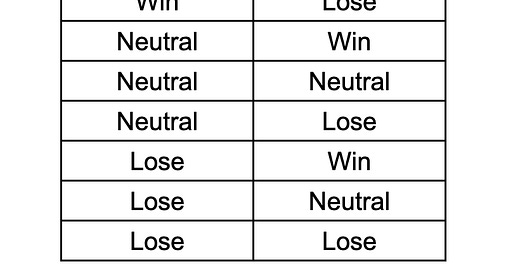The Game Theory of Relationships and Deals
Over the past few years I’ve been slowly making the transition from full-time engineer to full-time entrepreneur. I’ve built a BUNCH of stuff, cut a ton of deals (both investment and for my companies). Most value is built, not dealt, BUT a lot of value is destroyed in bad deals, mismatched expectations, and ruined relationships. You have no idea how much of the people stuff I’ve seen kill companies (not just cofounders and investors, but technical folks not being good at sales). Besides building a great product, it’s probably the most important part of company building.
Recently I’ve been formulating a bit of a framework for deals / relationships in my head. I know this sounds corny (anyone heard of the art of the deal? more like art of negotiation), but what I’ve realized is that there’s a game theory these large deals and relationships that’s incredibly important to learn. As a nerd who talks about things in math terms it’s how my mind thinks about these things.
In college, I only took micro / macro economics, but game theory really interested me so I bought one of the graduate-level textbooks and read most of it (wish I had the link, I don’t have it anymore, but it was pretty dry). There’s the classic prisoners dilemma (which is about downside), but there are MANY other games that happen behaviorally between rational actors (rational lol). Relationships are just extensions of these games which are multi-game, and trust is some decay function of how well deals with a actor have gone in the past. Reputation is how many people net trust you for various reasons.
Human Relationship Games
Recently I’ve been trying to think about how many of these games look, and what you realize about human psychology is that most of are extremely binary about outcomes (good, bad, neutral). We don’t think a lot about HOW bad things were, and once we detach from things, they fade into the past pretty fast (~years). So every situation relationship is a game. And then life tends to be a very-complicated multiparty game between them. The thing that’s interesting about this is that it’s a actually a pretty straight forward multi-party game. Most people want to do good things for other people, but there’s always a question of how to create those good outcomes.
Every game happens between you and a counterparty, and with these as the game outcomes we can filter them into a few buckets:
There are a few things to note in these games:
There is additional penalty for your counterparty losing (downstream reputation effects)
For you to understand the game (and create winning situations) it is critical that you understand what your counterparty wants and doesn’t want
After looking at this table, one question I had for myself was, is there a way to create games where nobody loses?
This is distinct from games where everybody wins (which are aspirational, but very hard to create reliably). After some thought, I think it actually is possible to have a much better hit rate on at-least-neutral games for both parties. Some basic principles:
Both parties need to know what they themselves want - this includes you helping your counterparty figure out what they want
Both parties need to fully understand terms (including potentially hidden ones)
Both parties need to accept tail risk (out of control or distribution events)
Then, one of two things happens: either someone doesn’t take the deal, continue with the relationship etc, OR as long as parties are rational they’ll either end up with a neutral outcome (knew the risks). It also means you can easily prevent yourself from losing (just understand the game), and also significantly help prevent them from losing (help the understand it too, and don’t do deals with people who don’t). Relationships are a special case where you need to keep evaluating this.
This is one version of the language here. In normal speak the advice is “know what you’re getting yourself into and make sure the other person does too“. At the end of the day it’s all about relationships and creating new things. That’s what I’m here to do.





